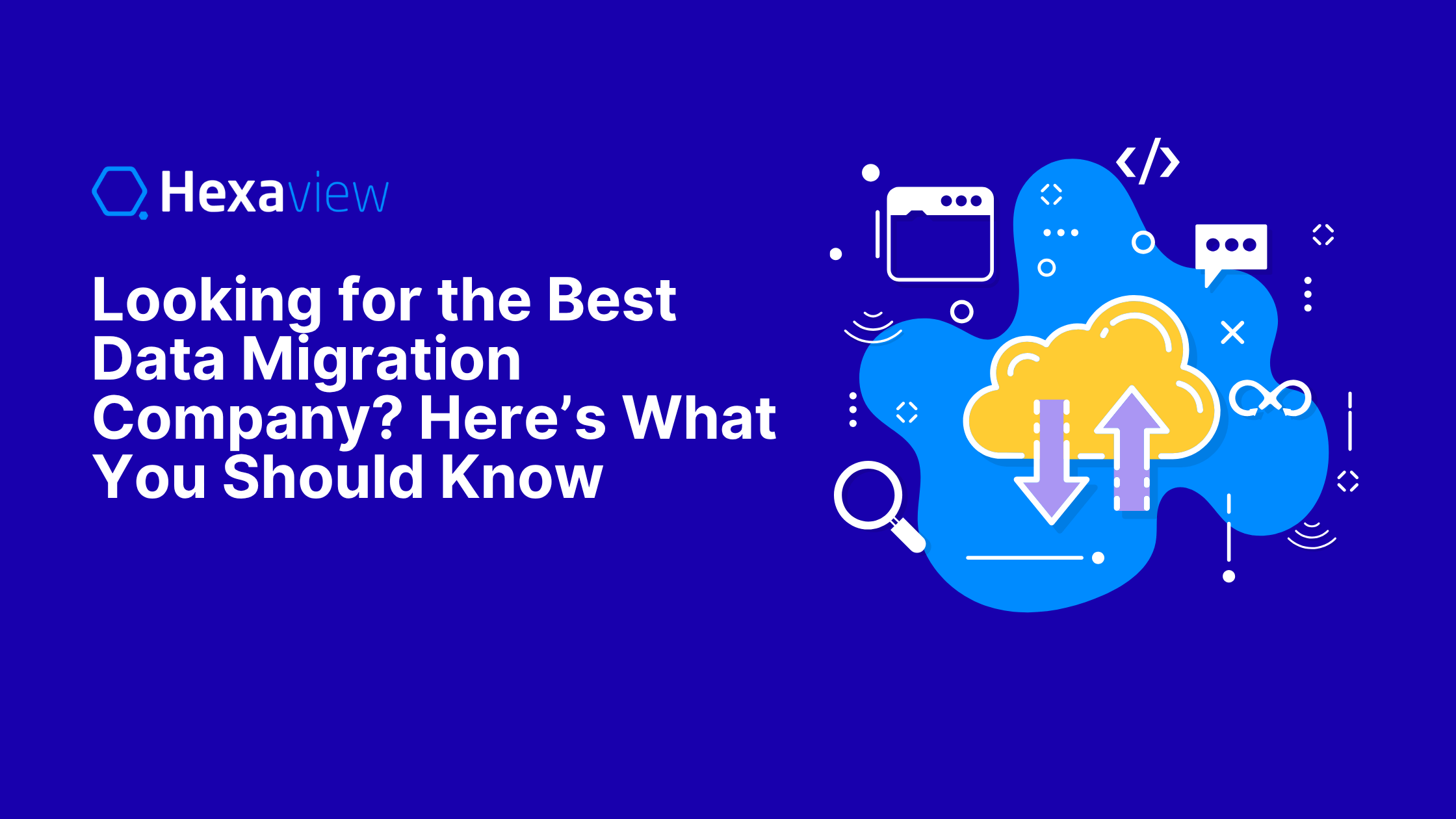Let’s be honest—data migration isn’t exactly exciting to most people. But if you’re planning a big move to the cloud, switching platforms, or merging systems after an acquisition, it’s a mission-critical step you can’t afford to overlook.
Why? Because data is the backbone of your business. It's what powers your CRM, drives your analytics, supports your operations, and helps you serve your customers better. So, when it comes time to migrate that data, you don’t just need a vendor—you need a reliable partner. A team that won’t mess it up.
That’s where finding the best data migration company comes in. And that’s exactly what we’ll help you figure out in this guide.
Why Data Migration Is a Big Deal (And Not Just for IT Teams)
Let’s say you’re moving to Salesforce, upgrading to a modern ERP, or shifting everything to AWS. Sounds great in theory—until you realize how much of your old data needs to come along for the ride. And it’s not just about moving files from one folder to another.
It’s about:
- Cleaning up old, inconsistent, and duplicate records
- Making sure customer and transaction data stays intact
- Mapping fields correctly between systems
- Keeping everything secure and compliant
- Avoiding business disruption during the transition
This isn’t a job for a junior developer or an overworked internal IT team. It requires planning, precision, and deep technical know-how.
That’s why so many businesses look for expert help. And not just any help—they want to work with the best data migration company they can find.
What Can Go Wrong Without a Specialist?
Plenty. And the stakes are higher than most people think.
Here are some common DIY migration headaches:
- Data Loss: Records vanish. Entire customer histories disappear. And no one knows where they went.
- Inaccurate Mapping: Customer names get swapped with phone numbers. Address fields don’t align. It’s chaos.
- Security Gaps: Sensitive data gets exposed in transit. You’re now facing potential compliance fines.
- Downtime: You assumed it would take one day. It takes five. Meanwhile, your business is on pause.
- Broken Integrations: Your shiny new system doesn’t talk to your other platforms anymore.
Bottom line: doing it yourself (or choosing the wrong vendor) can turn a smart tech upgrade into a nightmare.
So… What Makes a Data Migration Company the Best?
Let’s break it down. The best data migration companies share a few essential qualities. If your potential partner ticks most or all of these boxes, you’re on the right track.
1. They Have Real Experience (Not Just Buzzwords)
Look for a provider with actual experience in data migration—not just cloud consulting or IT services in general. Ask questions like:
- Have they worked with companies similar to yours?
- Do they have case studies or references?
- What kinds of systems have they migrated before (Salesforce, SAP, Oracle, custom-built platforms)?
Experience matters. The more complex your environment, the more important it is to have a seasoned team that’s seen it all before.
2. They Offer End-to-End Services
The best companies don’t just move data—they make sure it’s ready for business when it lands in the new system.
That includes:
- Data discovery and profiling
- Cleaning and deduplication
- Field mapping and transformation
- Test migrations
- Validation and user testing
- Post-migration support
They’re with you before, during, and after the move. That’s what a real partner does.
3. They Know Their Tech (Inside and Out)
Every project is different. You might be moving from SQL Server to AWS Redshift. Or from a homegrown CRM to Salesforce. The best data migration company won’t flinch—they’ve seen every scenario under the sun.
Look for expertise in:
- Database technologies (Oracle, PostgreSQL, MySQL, etc.)
- Cloud platforms (AWS, Azure, GCP)
- ETL tools (Informatica, Talend, custom pipelines)
- SaaS platforms like Salesforce, HubSpot, NetSuite, and Workday
If they’re only familiar with a handful of systems, they might not be the right fit for your migration.
4. They Treat Security Seriously
We can’t overstate this. Data security and compliance aren’t optional anymore.
Make sure your vendor:
- Encrypts data during transfer
- Has clear access controls and audit trails
- Is familiar with relevant regulations like GDPR, HIPAA, or SOC 2
- Offers data backup and rollback options in case of issues
Your data is valuable—and sometimes sensitive. Don’t work with anyone who doesn’t have strong security baked into their process.
5. They’re Transparent, Flexible, and Communicative
Great tech skills are important—but so is how a company communicates and collaborates. The best migration partners:
- Keep you in the loop with regular updates
- Explain timelines, risks, and expectations clearly
- Are honest about challenges (no sugar-coating)
- Offer flexible pricing and project plans
Good communication prevents surprises. And in data migration, surprises are rarely good.
Real-World Use Cases Where a Good Migration Partner Matters
Businesses call in the pros for all kinds of data migration projects, such as:
- Moving to the Cloud: Shifting from legacy systems to AWS, Azure, or Google Cloud
- Switching CRMs or ERPs: Migrating customer data from older tools to Salesforce, HubSpot, or Dynamics
- System Mergers: Consolidating multiple platforms after an acquisition or merger
- Building a Data Lake: Moving data to a central source for analytics and AI
- Upgrading Core Systems: Moving from Oracle to PostgreSQL or from SQL Server to Snowflake
In each of these cases, the risk of getting it wrong is high. That’s why working with the best possible partner is non-negotiable.
What the Data Migration Process Should Look Like
A reliable data migration partner won’t leave you guessing. Here’s a typical roadmap:
Step 1: Assessment and Planning
Understand what data is being moved, where it’s going, and how it’s structured. This is where expectations, risks, and timelines are set.
Step 2: Data Preparation
Clean up messy records, identify duplicates, and fix formatting issues. Trust us—this step saves tons of headaches later.
Step 3: Mapping and Testing
Line up data fields between old and new systems. Then run small-scale tests to make sure everything flows correctly.
Step 4: Migration Execution
This is the real deal. The team moves the data—often in stages—to avoid disruptions. They validate results at each step.
Step 5: Post-Migration Support
The migration is “done,” but support continues. If users notice problems or glitches, the team is ready to jump in and fix them.
Questions to Ask Before Signing a Deal
Choosing the best data migration company means asking the right questions up front:
- Can you show me similar projects you’ve completed?
- How do you handle sensitive or regulated data?
- What tools do you use for transformation and validation?
- Will we have a dedicated team or project manager?
- How long will the project take—and what’s the plan if things go off track?
If they answer clearly, confidently, and transparently—you’re probably in good hands.
Why Companies Trust Hexaview for Data Migration
At Hexaview, we’ve helped companies of all sizes move their data with confidence. Whether you’re migrating thousands of customer records, terabytes of financial data, or the entire backbone of your operations—we’re equipped to handle it.
What sets us apart:
Deep technical expertise across platforms
Proven frameworks that reduce risk and downtime
Flexible, scalable solutions tailored to your business
Transparent communication from day one
Strict focus on data security and compliance
We don’t just migrate your data. We help you move forward.
Wrapping Up: Don’t Take Chances with Your Data
Your data isn’t just numbers on a screen—it’s customer trust, business history, and future insight all rolled into one. Choosing the best data migration company ensures that everything you’ve built moves safely into your next chapter.
So take the time to vet your options. Ask the right questions. Look beyond the lowest price. Because when it comes to data, getting it right the first time makes all the difference.
.svg)


%201.svg)
